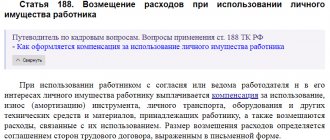ST 140 of the Criminal Code of the Russian Federation.
Unlawful refusal by an official to provide documents and materials collected in the prescribed manner that directly affect the rights and freedoms of a citizen, or providing a citizen with incomplete or knowingly false information, if these actions caused harm to the rights and legitimate interests of citizens, is punishable by a fine of up to two hundred thousand rubles. or in the amount of wages or other income of the convicted person for a period of up to eighteen months, or by deprivation of the right to hold certain positions or engage in certain activities for a period of two to five years.
Commentary to Art. 140 Criminal Code
1. The subject of the crime is documents and materials located in state authorities or local government bodies and collected in the established (i.e. only legal) manner that directly affect the rights and freedoms of a citizen (for example, materials of official investigations, prosecutorial checks, etc. .), as well as incomplete or deliberately false information in such documents and materials.
2. The objective side is characterized by alternatively provided inaction (illegal refusal to provide documents and materials collected in the prescribed manner that directly affect the rights and freedoms of a citizen, in any form) or action (providing incomplete or deliberately false information in such documents and materials), resulting from the commission of an act, the consequence (harm to the rights and legitimate interests of citizens) and the causal relationship between the act and the consequence. The methods of committing a crime can be different (for example, direct refusal to provide information or evasion of providing it) and do not affect qualifications.
3. The crime is completed from the moment the consequences occur in the form of harm to the rights and legitimate interests of citizens.
INAPPROPRIATE INFORMATION AS A WAY TO GET MONEY BACK FOR A GOODS (WORK, SERVICE)
Providing inappropriate information about a product (work, service) is the most accurate and harmless basis for returning money for the product. Harmless because, as in the case of violation of deadlines for the transfer of goods (performance of work), the case will not be delayed by “proof”.
The fact is that if you purchased a product and a defect was discovered in it, the presence of this defect still needs to be proven (examination, evaluation, comparison, etc.). In the article “What is a product deficiency”, the concept of “disadvantage” is given special attention. However, practice shows that even for high-quality goods, manufacturers and sellers provide inappropriate information. According to Art. 10 of the Law of the Russian Federation “On the Protection of Consumer Rights”, the manufacturer (executor, seller) is obliged to promptly provide the consumer with the necessary and reliable information about goods (works, services), ensuring the possibility of their correct choice.
Thus, there are 3 criteria for defining the concept of “inappropriate information”:
1. Timely The timeliness of providing information presupposes the consumer’s opportunity to familiarize himself with information about a product at the time of its selection from among others. Actually, information about the product should determine its choice. Thus, the consumer has the right to familiarize himself with the effect of the product, its operation, packaging and accompanying documentation. In addition, the consumer has the right to demand that a certificate or declaration of conformity for the product be provided for review. If information about a product was not provided at the time of its purchase, but, say, later, we should talk about the untimely provision of information.
2. Necessary Necessary information is the full amount of information about the product, based on which the consumer should have a clear idea of the properties and characteristics of the product. So, according to paragraph 2 of Art. 10 of the Law of the Russian Federation “On the Protection of Consumer Rights”, information about goods (work, services) must necessarily contain: - the name of the technical regulation or other designation established by the legislation of the Russian Federation on technical regulation and indicating the mandatory confirmation of the conformity of the product; — information about the basic consumer properties of goods (works, services); — rules and conditions for the effective and safe use of goods (works, services); — information on the energy efficiency of goods for which the requirement for such information is determined in accordance with the legislation on energy saving and increasing energy efficiency; - service life or shelf life of goods (work), established in accordance with this Law, as well as information about the necessary actions of the consumer after the expiration of the specified periods and possible consequences for failure to perform such actions, if the goods (work) after the expiration of the specified periods pose a danger to life , health and property of the consumer or become unsuitable for intended use; — address (location), corporate name (name) of the manufacturer (performer, seller), authorized organization or authorized individual entrepreneur, importer; — information on mandatory confirmation of conformity of goods (work, services) specified in paragraph 4 of Article 7 of this Law; — information on the rules for the sale of goods (performance of work, provision of services); - an indication of a specific person who will perform the work (provide a service), and information about him, if this is relevant, based on the nature of the work (service).
3. Reliable Reliability of information about a product means its compliance with the actual properties of the product. For example, a consumer purchased a SONY power supply. Having contacted the Sony representative office in the Russian Federation, an explanation was received from the copyright holder of the SONY trademark that this product was not manufactured by him. Thus, even if there are no complaints about the quality of the product, the consumer has the right to return the money for it due to the provision of inappropriate information about the manufacturer.
In order to recognize information as “inappropriate”, at least one of the above criteria .
Information about the product (manufacturer, importer, organization authorized by the manufacturer) is transmitted to the consumer in writing and in Russian . Providing this information in a foreign language cannot be considered as providing the necessary information.
Information can be placed on labeling , in technical documentation (operating instructions, user manual, product passport, insert sheets, etc.), packaging .
NOTE!
Sometimes, when purchasing a product or ordering a service, the consumer is asked to sign the acceptance certificate for the goods (work, service). Often, the templates for such acts also contain the wording “I received information about the product” (and it is assumed that it is provided in writing), while no information was provided. By signing this statement, you deprive yourself of the opportunity to make claims regarding the failure to provide information on the product. In such cases, firstly, you should always carefully read what you have to sign for, and secondly, it is worth pointing out that the information is not actually presented.
Article 12 of the Law of the Russian Federation “On the Protection of Consumer Rights” gives the consumer the right to refuse the product within a reasonable time and demand a refund, as well as compensation for losses, if the consumer was not immediately provided with inappropriate information about the product . This rule applies to all groups of goods, including goods that cannot be exchanged/returned if they do not match the style, size, color, or configuration (Article 25 of the Law).
PAY ATTENTION to the wording in the article - the right to refuse within a reasonable time . Resolution of the Plenum of the Supreme Court of the Russian Federation dated June 28, 2012 N 17 “On the consideration by courts of civil cases in disputes regarding the protection of consumer rights” contains the following explanation: “When determining the reasonable period provided for in paragraph 1 of Article 12 of the Law, during which the consumer has the right to refuse to fulfill the contract and demand a refund of the amount paid for the product and compensation for other losses, it is necessary to take into account the shelf life of the product, the seasonality of its use, consumer properties, etc. ”
Along with Articles 10 and 12 of the Law “On the Protection of Consumer Rights,” Article 16 , which also provides the consumer with a wide choice of grounds for refusing a product. So, according to paragraph 3 of Art. 16 of the Law of the Russian Federation “On the Protection of Consumer Rights” the seller (performer) does not have the right to perform additional work or services for a fee without the consent of the consumer. The consumer has the right to refuse to pay for such work (services), and if they are paid, the consumer has the right to demand that the seller (performer) return the amount paid. For example, very often citizens contact our society by calling the so-called “Computer Help” to their home. The price for a service ordered by a consumer is usually announced upon his request over the phone. However, upon completion of the work, the master issues a receipt for an amount 2 times higher than initially indicated. In such cases (if you intend to argue and defend your rights), firstly, you must state your claims in the work completion certificate, secondly, in the list of works, try to identify which services, in your opinion, are unnecessary and, third, demand a refund (if money has been paid) for overpaid services.
NOTE!
Article 12 of the Law “On Protection of Consumer Rights” can also be used if inappropriate information caused a deficiency. For example, you purchased expensive underwear (1st layer clothing, underwear), but there was no marking on the product/packaging regarding the method of care. As a result, after machine washing, which was objectively not intended for washing such laundry, the product became unusable. There is evidence of improper use, however, due to failure to provide proper information, the consumer has the right to demand a refund.
Here is the opposite example: a consumer purchased a kerosene heater, and during its operation, a residential building burned down. According to the owner's manual, it should not be left unattended, while according to the testimony of the victims, reflected in the Resolution to refuse to initiate criminal proceedings, the residents left the heater on the first floor while they put the child to sleep on the second. This circumstance serves as the basis for refusing to compensate the victims for losses, since they improperly used the goods.
Thus, if you cannot return the product to the seller, citing its inadequate quality, you can almost always get a refund due to the provision of inappropriate information about the product .
Second commentary to Art. 140 of the Criminal Code of the Russian Federation
1. The object of the crime is the constitutional right of everyone to receive information in any legal way (Part 4 of Article 29 of the Constitution of the Russian Federation). According to Part 2 of Art. 24 of the Constitution of the Russian Federation, state authorities and local government bodies, their officials are obliged to provide everyone with the opportunity to familiarize themselves with documents and materials that directly affect their rights and freedoms, unless otherwise provided by law.
2. The objective side of this crime is:
1) in inaction or action, i.e. in the unlawful refusal of an official to provide documents and materials collected in the prescribed manner that directly affect the rights and freedoms of a citizen, or provision of incomplete or deliberately false information to a citizen;
2) the occurrence of certain consequences;
3) the causal relationship between actions (inactions) and the specified consequences.
The crime is completed from the moment harm is caused to the rights and legitimate interests of citizens in connection with the refusal to provide the citizen with the specified information.
3. The subject of this crime is only a civil servant or a person in possession of documents and materials collected in the prescribed manner that affect the rights and freedoms of citizens (for example, officials of investigative bodies).
4. The subjective side is characterized by direct intent.
What documents does the Federal Tax Service request?
The right of the inspectorate to request information from organizations and entrepreneurs is enshrined in the Tax Code.
The Federal Tax Service may be interested in both the taxpayer’s documentation and information about the company’s counterparties or information about a specific transaction. The inspectorate has the right to request information about a specific transaction not only from its direct participants, but also from third parties who have the necessary information.
The Federal Tax Service receives the necessary information on the basis of a written request regarding the taxpayer himself and regarding his counterparties. When responding, it is necessary to comply with the deadlines established by law and send the answer on time. The law does not contain restrictions on the number of documents requested. The law provides for a fine for failure to provide a response to the request of the Federal Tax Service - the request cannot be ignored.
The Federal Tax Service has the right to demand documents (clauses 6 – 9, 11, 12 of Article 88 of the Tax Code of the Russian Federation):
- when conducting an audit - according to the period or tax being audited;
- when requesting a counterparty - only for the requested person, if the organization being inspected is not your counterparty, but you have the requested information, you will have to provide it;
- You have the right to request only those documents that the organization is obliged to prepare and maintain.
Usually they require confirmation of benefits and deductions, reduced tariffs, contracts and issued invoices in relation to counterparties.
When should they be sent?
If they check you, the answer is provided within the following time frame (clause 6 of article 6.1, clauses 1, 3 of article 93 of the Tax Code of the Russian Federation):
- 10 days from the date specified in the request (if received in person), or from the date of its receipt via electronic communication channels;
- 16 days from the day the inspection sent the request by mail, if the letter was received earlier than 6 days from the date of its sending, the period will be 10 days from the date of its receipt;
- 11 days from the date the request is posted in the taxpayer’s personal account.
If a counterparty or other person is being checked, the response is sent within (clauses 1, 1.1, 5 of Article 93.1 of the Tax Code of the Russian Federation):
- 5 days from the date specified in the request (if received in person), or from the date of its receipt via electronic communication channels;
- 11 days from the date when the inspection sent the request by mail, if the letter was received earlier than 6 days from the date of its sending, the period will be 5 days from the date of its receipt;
- 6 days from the date the request is posted in the taxpayer’s personal account.
Outside the framework of tax audits, the deadlines for submission are similar to the deadlines for auditing a taxpayer.
When calculating deadlines, only working days are considered.
If it is not possible to send a response within the specified period, notify the tax authority in the form approved by Order of the Federal Tax Service No. ММВ-7-2/ [email protected] dated 04/24/2019. The law provides for liability for a late response to a request from the Federal Tax Service, even if the delay is small.
Sample request from the Federal Tax Service:



